When facing legal challenges, individuals often find themselves weighing the benefits of public defenders against private attorneys. Public defenders offer essential legal representation for those unable to afford an attorney, while private attorneys provide personalized services that may lead to better outcomes in complex cases. Understanding the strengths of each option can help you make an informed decision based on your financial situation and legal needs.
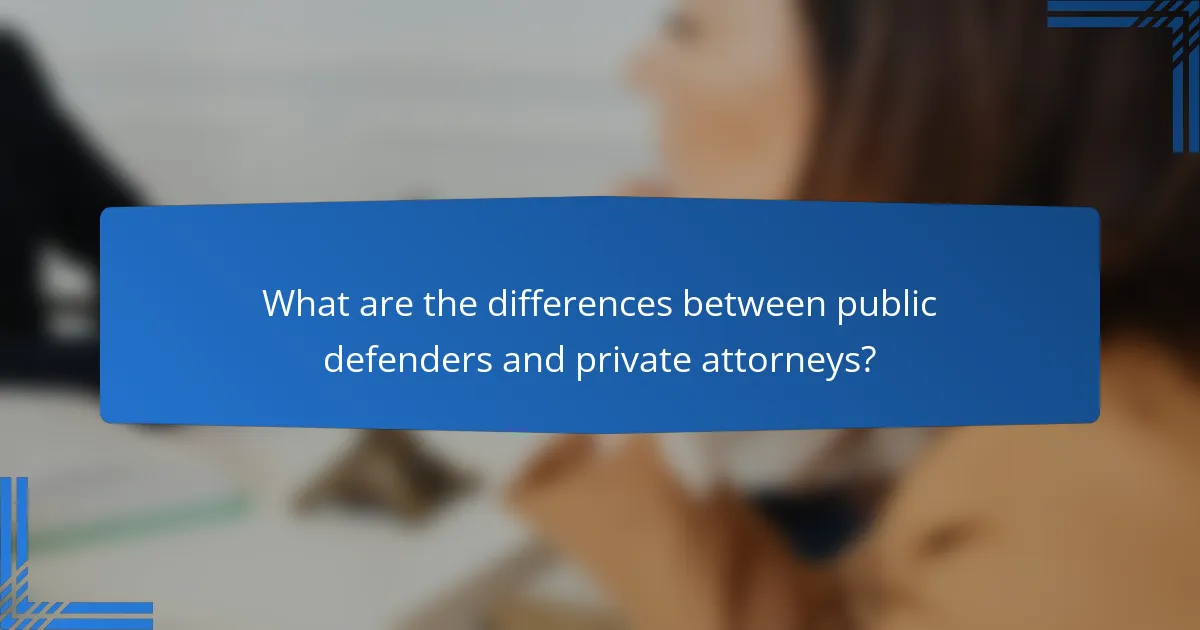
What are the differences between public defenders and private attorneys?
Public defenders are government-funded lawyers assigned to represent individuals who cannot afford legal representation, while private attorneys are hired by clients who can pay for their services. The choice between the two often hinges on factors such as cost, availability, and expertise.
Cost comparison
Public defenders typically provide their services at no cost to the client, funded by taxpayer money. In contrast, private attorneys charge fees that can vary widely, often ranging from hundreds to thousands of dollars per hour, depending on their experience and the complexity of the case.
When considering legal representation, it’s essential to assess your financial situation. If you qualify for a public defender, you may save significant amounts, but if you can afford a private attorney, you might benefit from more personalized service.
Case load and availability
Public defenders often handle a high volume of cases, which can limit the time they can dedicate to each client. This heavy caseload may lead to less availability for meetings or consultations compared to private attorneys, who typically manage fewer cases and can offer more focused attention.
If you require immediate assistance or have a complex case, a private attorney may be more accessible and responsive. However, if your case is straightforward and you qualify for a public defender, they can still provide competent representation.
Experience and specialization
Public defenders are generally experienced in criminal law, as they frequently handle similar cases. However, they may not have the same level of specialization as private attorneys who can focus on specific areas of law, such as family law, corporate law, or personal injury.
When choosing between the two, consider the nature of your legal issue. If your case requires specialized knowledge, a private attorney with relevant experience might be more beneficial. Conversely, for standard criminal defense, a public defender can effectively represent your interests.
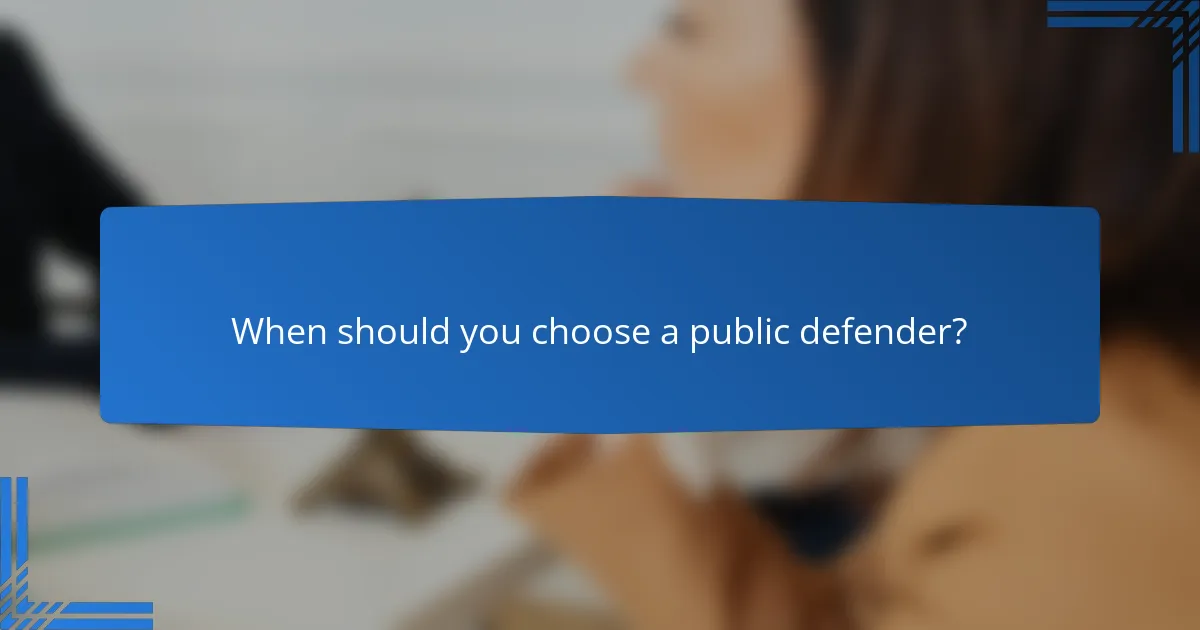
When should you choose a public defender?
You should consider a public defender if you cannot afford a private attorney and face criminal charges. Public defenders are appointed by the court and provide legal representation at no cost, making them a viable option for individuals with limited financial resources.
Financial eligibility criteria
To qualify for a public defender, you typically need to demonstrate financial need. This often involves providing information about your income, assets, and expenses during a court hearing or through a financial affidavit.
Eligibility criteria can vary by jurisdiction, but generally, if your income is below a certain threshold—often around 125% to 200% of the federal poverty level—you may qualify. It’s important to check local guidelines for specific income limits and documentation requirements.
Types of cases handled
Public defenders primarily handle criminal cases, including misdemeanors and felonies. They represent clients in a variety of situations, such as theft, assault, drug offenses, and more serious charges like homicide.
While public defenders can manage a wide range of cases, they may not handle civil matters, such as family law or immigration cases. If you need assistance in those areas, you may need to seek a private attorney or legal aid organization.

When should you hire a private attorney?
You should consider hiring a private attorney when your legal situation is complex, when you have specific preferences for representation, or when the potential for a better outcome is significant. Private attorneys often provide personalized attention and expertise that can be crucial in navigating the legal system.
Complexity of the case
If your case involves intricate legal issues, multiple charges, or significant potential penalties, a private attorney may be a better choice. They typically have more time and resources to dedicate to your case compared to public defenders, who often handle a high volume of cases.
For example, cases involving white-collar crimes, serious felonies, or complicated family law matters may benefit from the specialized knowledge that a private attorney can offer. Assess the complexity of your situation to determine if a private attorney’s expertise is warranted.
Personal preferences
Your personal preferences play a crucial role in deciding whether to hire a private attorney. If you value direct communication, personalized strategies, and a tailored approach to your defense, a private attorney can provide that level of service.
Consider factors such as your comfort level with the attorney, their availability for consultations, and their approach to your case. If you prefer a more hands-on relationship with your legal representative, a private attorney may align better with your expectations.
Potential for better outcomes
Hiring a private attorney can often lead to better outcomes in your case. They may have established relationships with local judges and prosecutors, which can be advantageous during negotiations or plea deals.
Additionally, private attorneys may have more resources to conduct thorough investigations, gather evidence, and prepare a strong defense. Weigh the potential benefits against the costs involved, as private attorney fees can vary significantly, often ranging from hundreds to thousands of dollars depending on the case complexity and attorney experience.
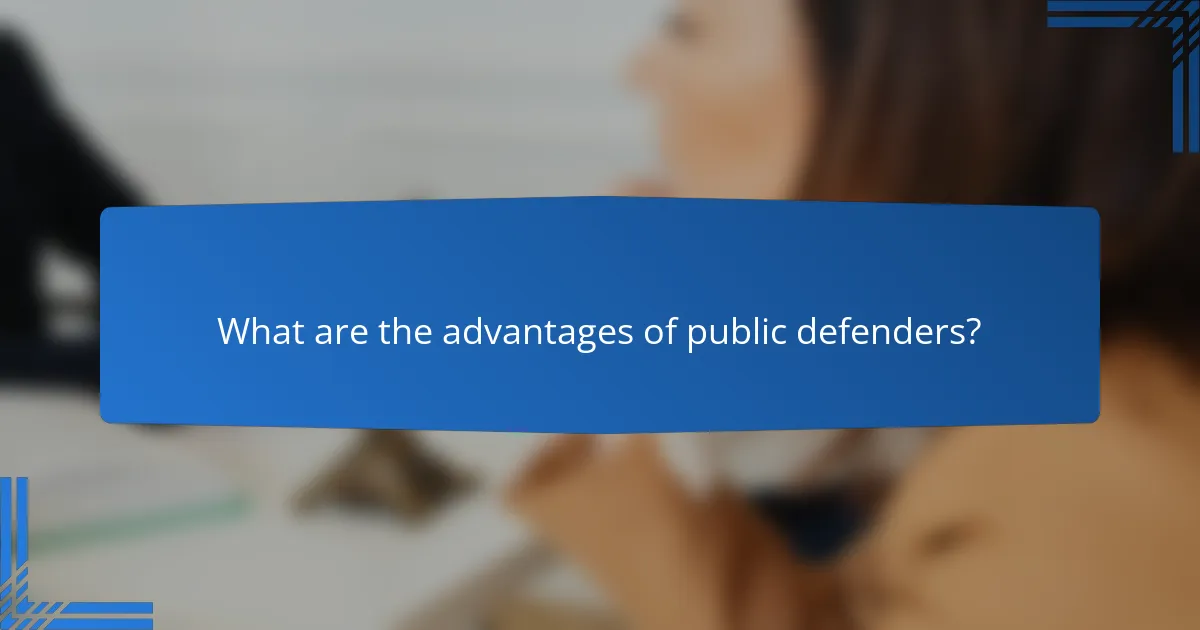
What are the advantages of public defenders?
Public defenders offer several advantages, particularly for individuals who cannot afford private legal representation. They provide access to legal services at no cost, ensuring that everyone has the right to a fair trial regardless of their financial situation.
Access to legal representation
Public defenders ensure that individuals facing criminal charges receive legal representation, which is a fundamental right. This access is crucial for those who may not have the financial means to hire a private attorney, as public defenders are funded by the government to represent indigent defendants.
In many jurisdictions, public defenders are available to assist clients at various stages of the legal process, from arraignment through trial. This means that individuals can receive timely legal advice and support, which is essential for navigating the complexities of the legal system.
Familiarity with local courts
Public defenders often have extensive experience working within their local court systems. This familiarity allows them to understand the specific procedures, judges, and prosecutors involved in cases, which can significantly benefit their clients.
Being well-acquainted with local court dynamics enables public defenders to develop effective strategies tailored to the unique aspects of each case. Their knowledge of local laws and regulations can lead to better outcomes for defendants, as they can anticipate potential challenges and opportunities in the legal process.

What are the advantages of private attorneys?
Private attorneys offer several advantages, including personalized service and specialized legal expertise. These benefits can significantly impact the outcome of a case, making private representation a compelling choice for many individuals.
Personalized attention
Private attorneys typically provide more personalized attention compared to public defenders. With fewer cases to manage, they can dedicate more time to understanding their clients’ unique situations and needs.
This individualized approach often leads to better communication and a stronger attorney-client relationship. Clients can expect to have more direct access to their attorney, allowing for timely updates and discussions about case strategies.
Specialized legal expertise
Many private attorneys specialize in specific areas of law, such as criminal defense, family law, or corporate law. This specialization means they are often more knowledgeable about the intricacies and nuances of their chosen field.
For instance, a private attorney with a focus on criminal defense will be well-versed in local laws, court procedures, and effective defense strategies. This expertise can be crucial in navigating complex legal situations and achieving favorable outcomes.
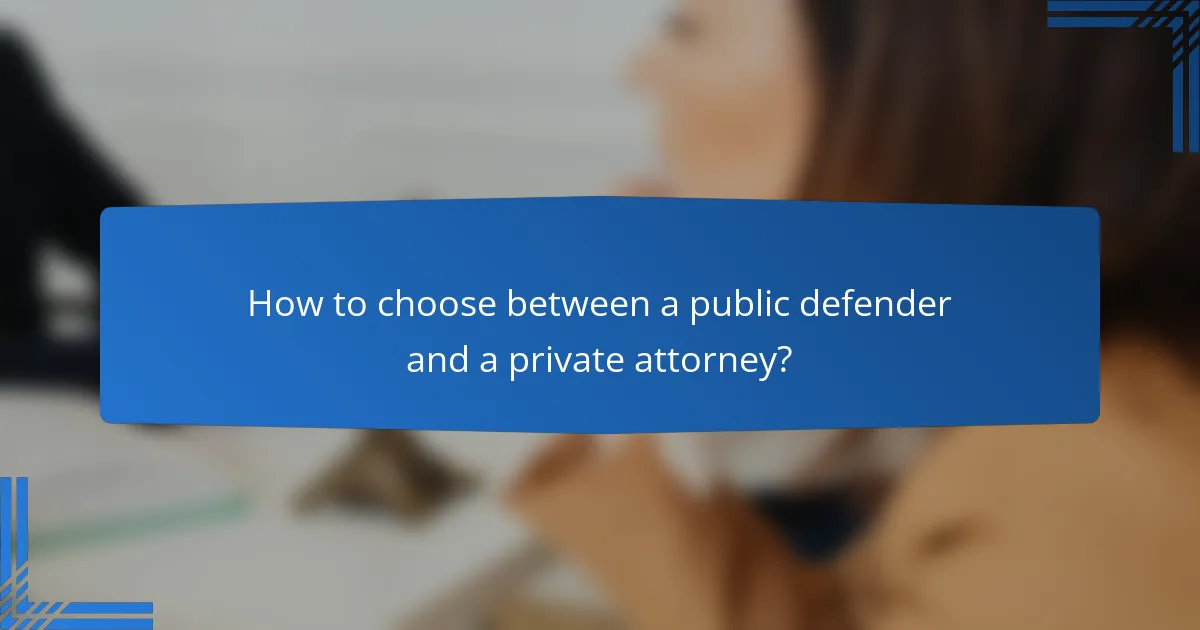
How to choose between a public defender and a private attorney?
Choosing between a public defender and a private attorney depends on your specific legal needs, financial situation, and the complexity of your case. Public defenders are often assigned to those who cannot afford legal representation, while private attorneys offer more personalized service but come at a cost.
Assessing your legal needs
Start by evaluating the nature of your legal issue. If your case involves serious charges, such as felonies, a private attorney may provide more comprehensive defense strategies. For less severe matters, a public defender may suffice, as they are trained to handle a wide range of cases.
Consider the complexity of your case as well. If it involves intricate legal arguments or extensive evidence, a private attorney might be better equipped to navigate these challenges. Public defenders often manage heavy caseloads, which can limit the time they can dedicate to each case.
Evaluating financial implications
Assess your financial situation to determine if you can afford a private attorney. Private attorneys typically charge hourly rates that can range from low hundreds to several hundreds of dollars, depending on their experience and location. If you qualify for a public defender, there are no direct legal fees, but you may still face court costs.
Consider the potential long-term costs of your decision. A private attorney may lead to a more favorable outcome, potentially saving you money in fines or other penalties down the line. Weigh the immediate costs against the possible benefits of hiring a private attorney versus relying on a public defender.
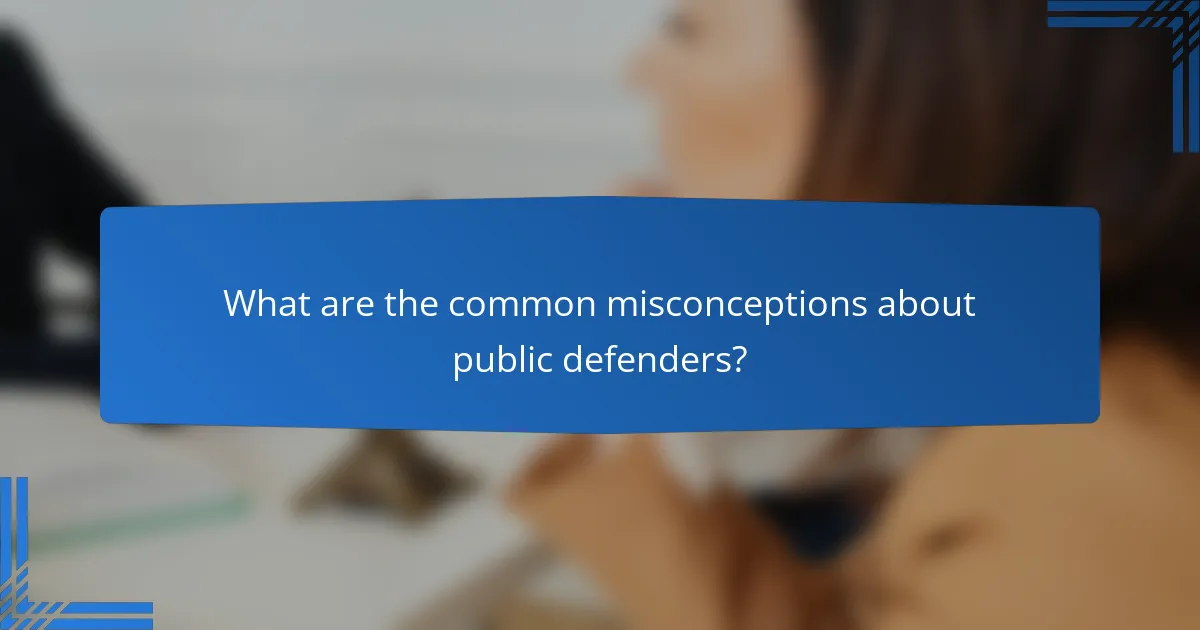
What are the common misconceptions about public defenders?
Many people believe that public defenders provide inferior legal representation compared to private attorneys. This misconception often stems from the perception that public defenders are overworked and lack resources, which can lead to a lack of personalized attention for clients.
Quality of representation
The quality of representation by public defenders can vary significantly based on several factors, including the jurisdiction and the specific attorney’s experience. While some public defenders handle large caseloads, many are dedicated professionals who strive to provide effective defense for their clients.
In many cases, public defenders have extensive experience in criminal law and are familiar with local court procedures, which can be advantageous. However, clients should be aware that public defenders may have less time to dedicate to each case compared to private attorneys, who typically manage fewer clients.
When deciding between a public defender and a private attorney, consider the complexity of the case and the potential consequences. For straightforward cases, a public defender may suffice, but for more serious charges, hiring a private attorney could provide a more tailored defense strategy.
